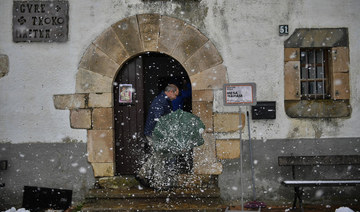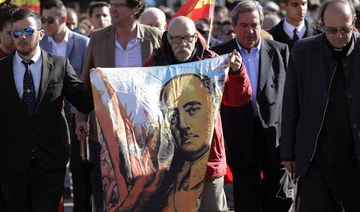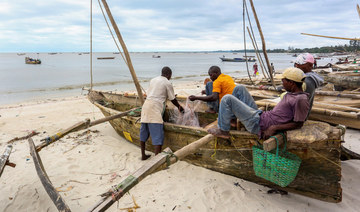MADRID: Prime Minister Pedro Sánchez’s Socialists won Spain’s national election on Sunday but large gains by the upstart far-right Vox party appear certain to widen the political deadlock in the European Union’s fifth-largest economy.
After a fourth national ballot in as many years and the second in less than seven months, the left-wing Socialists held on as the leading power in the national parliament. With 99.9% of the votes counted, the Socialists captured 120 seats, down three seats from the last election in April and still far from the absolute majority of 176 needed to form a government alone.
The big political shift came as right-wing voters flocked to Vox, which only had broken into Parliament in the spring for the first time. Sunday’s outcome means there will be no end to the stalemate between forces on the right and the left in Spain, suggesting the country could go many more weeks or even months without a new government.
The far-right party led by 43-year-old Santiago Abascal, who speaks of “reconquering” Spain in terms that echo the medieval wars between Christian and Moorish forces, rocketed from 24 to 52 seats. That will make Vox the third leading party in the Congress of Deputies, giving it much more leverage in forming a government and crafting legislation.
The party has vowed to be much tougher on both Catalan separatists and migrants.
Abascal called his party’s success “the greatest political feat seen in Spain.”
“Just 11 months ago, we weren’t even in any regional legislature in Spain. Today we are the third-largest party in Spain and the party that has grown the most in votes and seats,” said Abascal, who promised to battle the “progressive dictatorship.”
Right-wing populist and anti-migrant leaders across Europe celebrated Vox’s strong showing.
Marine Le Pen, who heads France’s National Rally party, congratulated Abascal, saying his impressive work “is already bearing fruit after only a few years.”
In Italy, Matteo Salvini of the right-wing League party tweeted a picture of himself next to Abascal with the words “Congratulations to Vox!” above Spanish and Italian flags. And in the Netherlands, anti-Islam Dutch lawmaker Geert Wilders posted a photograph of himself with Abascal and wrote “FELICIDADES” — Spanish for congratulations — with three thumbs-up emojis.
With Sunday’s outcome, the mainstream conservative Popular Party rebounded from its previous debacle in the April vote to 88 seats from 66, a historic low. The far-left United We Can, which had rejected an offer to help the Socialists form a left-wing government over the summer, lost some ground to get 35 seats.
The night’s undisputed loser was the center-right Citizens party, which collapsed to 10 seats from 57 in April after its leader Albert Rivera refused to help the Socialists form a government and tried to copy some of Vox’s hard-line positions.
Sánchez’s chances of staying in power still hinges on ultimately winning over the United We Can party and several regional parties, a complicated maneuver that he has failed to pull off in recent months.
Sánchez called on opponents to be “responsible” and “generous” by allowing a Socialist-led government to remain in charge.
“We extend this call to all the political parties except for those who self-exclude themselves ... and plant the seeds of hate in our democracy,” he added, an apparent allusion to far-right and also possibly to separatist Catalan parties.
United We Can leader Pablo Iglesias extended an offer of support to Sánchez.
“These elections have only served for the right to grow stronger and for Spain to have one of the strongest far-right parties in Europe,” Iglesias said. “The only way to stop the far-right in Spain is to have a stable government.”
Pablo Casado, the leader of the Popular Party, also pledged to work to end months of political instability. He said “the ball was in the court” of Sánchez, though. In recent months his party and Citizens have struck deals with Vox to take over some cities and regional governments.
Bonnie Field, a professor on Global Studies at Bentley University in California, called the political situation a “mess government-wise.”
“Spanish politics are now increasingly complicated and any governing formula is going to require lots of negotiations, and people being open to criticism,” she said.
The Socialists took a hit in the country’s Senate, losing their absolute majority of 133 seats in the upper parliamentary chamber amid the significant conservative inroads.
Julia Giobelina, a 34-year-old web designer from Madrid, was angry at having to vote for the second time this year. But she said she cast her ballot in hopes of stopping Vox.
“They are the new fascism,” Giobelina said. “We citizens need to stand against privatization of health care and other public services.”
Spain returned to democracy in the late 1970s after a near four-decade right-wing dictatorship under the late Gen. Francisco Franco. The country used to take pride in claiming that no far-right group had seats in the national Parliament, unlike the rest of Europe. That changed in the spring, but the Socialists’ April victory was still seen by many as a respite for Europe, where right-wing parties had gained much ground.
Vox relied on its anti-migrant message and attacks on laws that protect women from domestic abuse as well as what it considers leftist ideology disguised as political correctness. Still, it does not advocate a break from the EU in the very pro-EU Spain.
It has nevertheless flourished after recent riots in Catalonia by separatists, capitalizing on Spanish nationalist sentiment stirred up by the country’s worst political conflict in decades. Many right-wingers were also not pleased by the Socialist government’s exhumation of Franco’s remains last month from his gargantuan mausoleum so he could no longer be exalted in a public place.
The debate over Catalonia, meanwhile, promises to fester.
The three Catalan separatist parties won a combined 23 seats on Sunday.
Many Catalans have been angered by the decision last month by Spain’s Supreme Court, which sentenced to prison nine Catalan politicians and activists who led a 2017 drive for the region’s independence. The ruling has triggered massive daily protests in Catalonia that left more than 500 people injured, roughly half of them police officers, and dozens arrested.
Far right surges amid Socialist win in Spain
Far right surges amid Socialist win in Spain

- After a fourth national ballot in as many years and the second in less than seven months, the left-wing Socialists held on as the leading power in the national parliament
- The big political shift came as right-wing voters flocked to Vox, which only had broken into Parliament in the spring for the first time
Anguish as Kenya’s government demolishes houses in flood-prone areas and offers $75 in aid

- People living near rivers, dams and other flood-prone areas told to vacate as heavy rains continue to pound
- The number of those affected by the flooding in Kenya has risen to 235,000, with most of them living in camps
NAIROBI, Kenya: Kenya’s government has begun bulldozing homes built in flood-prone areas and promising evicted families the equivalent of $75 to relocate after a deadline passed to evacuate amid deadly rains.
In the capital, Nairobi, a bulldozer ripped through iron-sheet walls as people watched in despair. Security forces with guns and batons stood guard and fired tear gas at some residents. The government last week told thousands of people living near rivers, dams and other flood-prone areas to vacate as heavy rains that have left 238 people dead in recent weeks continue to pound.
Most of those whose houses are demolished say they do not know where to go, even though the government claims they were notified about options. Human Rights Watch has accused the government of an inadequate response.
“Now what are we going to do? We love our president, and that is why we supported him. He should come to our aid,” Jekenke Jegeke told The Associated Press.
President William Ruto, who visited the vast Mathare informal settlement along the Nairobi River on Monday, said those whose houses had been demolished would be given 10,000 Kenyan shillings ($75) to help them resettle elsewhere.
Three people, including two children, have died in Mathare after being run over by bulldozers in the demolitions — one before the president’s visit and two after it — according to civil society groups.
Opposition leader Raila Odinga last week warned the government against demolishing more houses without a resettlement plan in place.
The number of those affected by the flooding in Kenya has risen to 235,000, with most of them living in camps.
Interior Minister Kithure Kindiki on Tuesday reiterated an evacuation order to 200 families living in the Kijabe area an hours’s drive from Nairobi, where about 60 people were killed and houses were swept away when water broke through a blocked railway tunnel last week.
That disaster prompted the government’s evacuation order. It is not clear how many homes across Kenya have been demolished since then.
Meanwhile, Kenya’s Cabinet has said that water levels in the country’s two major hydroelectric dams – Masinga and Kiambere – have risen to “historic levels,” with people living downstream on the Tana River told to leave.
Eastern DR Congo faces ‘catastrophe’ from floods: UN
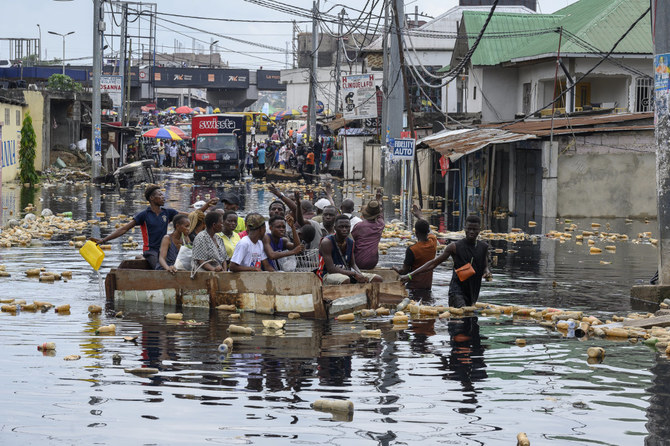
- The UN body voiced concern at the effect on health service provisions as sickness hit affected areas of the country
- Locals were reporting seeing hippos, crocodiles and snakes in flooded inhabited areas, risking fatal attacks, especially on children and livestock
KINSHASA: Eastern DR Congo faces a “humanitarian catastrophe” after being hit by severe flooding affecting about half a million people, the UN World Food Programme said Wednesday.
“Heavier rainfall than usual during the rainy season, prompted by climate change, has forced rivers and lakes to overflow, swallowing towns, villages and roads on the shores,” the WFP said in a report citing “chaos” in South Kivu and Tanganyika provinces.
Worst-affected are Haut-Lomami and Tanganyika provinces, which border the lake of the same name as well as neighboring Burundi, Tanzania and Zambia.
“All around Lake Tanganyika, and areas upstream of the Congo River basin, people have lost their homes, their fields and livelihoods,” the WFP reported, estimating 471,000 people were affected with 451,000 hectares (1.1 million acres) flooded, including 21,000 hectares of cropland.
“People in flooded areas need food, shelter, clean drinking water, health and sanitation support, as well as support to restart their livelihoods.
“However, WFP has very limited resources to respond to the flooding crisis due to current funding levels and the food assistance pipeline situation.”Democratic Republic of Congo (DRC).
“With towns and villages swallowed in the lakes and rivers, diseases are rife. Latrines have overflowed into the water that surrounds people’s homes and sanitation is poor.
“People are forced to wade through and wash their clothes and cooking implements in cholera-riddled water,” said the report, warning of “a whole host of animal-borne diseases.”
Locals were reporting seeing hippos, crocodiles and snakes in flooded inhabited areas, risking fatal attacks, especially on children and livestock.
Amid lost harvests, “people are struggling to feed their families which is leading to more people arriving in health care facilities with symptoms related to months of poor food intake. Especially children are at risk of developing malnutrition.”
Flooding has hit vast swathes of Africa in recent weeks, which have notably claimed 257 lives in Kenya, according to a latest toll Wednesday.
US House quickly defeats Republican hardliners’ effort to oust Speaker Johnson

- Democrats joined Republicans in a 359-43 vote to protect Johnson’s speakership to avoid a replay of the chaos that occurred in October
- Hakeem Jeffries, the House's Democratic Party leader, said he hoped to see House Republicans turn against party hard-liners
WASHINGTON: The US House of Representatives on Wednesday swiftly and overwhelmingly defeated an effort by firebrand Republican Marjorie Taylor Greene to remove Speaker Mike Johnson, a fellow Republican, from his leadership role.
Democrats joined Republicans in a 359-43 vote to protect Johnson’s speakership, in a bid to avoid a replay of the chaos that occurred in October when Republicans ousted his predecessor, Kevin McCarthy.
Greene’s move represented a rare Republican defiance of presidential candidate Donald Trump, who in a social media post following the House vote on Wednesday, said it was “not the time” for Republicans to try to push out their own speaker.
Greene’s measure, known as a motion to vacate, showcased the disorder that has marked Republicans’ slim 217-213 House majority, particularly since it had been clear that the effort would fail given Democrats’ opposition.
“I appreciate the show of confidence from my colleagues to defeat this misguided effort,” Johnson, 52, said following the vote. “Hopefully this is the end of the character assassination that has characterized the current Congress.”

Multiple Republicans criticized Greene’s move, including centrist Representative Marc Molinaro.
“This is not an individual who knows how to lead,” Molinaro said of Greene. “She’s not an individual who knows how to negotiate. And she certainly doesn’t seem to have any concern for the stability of the Congress or the people we represent.”
Greene stood flanked by fellow Republican Thomas Massie when she made her move against Johnson, criticizing him for a string of compromises with Democrats, who hold a majority in the Senate.
“Excuses like ‘this is just how you have to govern in divided government’ are pathetic, weak and unacceptable,” Greene said of Johnson. “Even with our razor-thin Republican majority we could have at least secured the border.”
Taunts and jeers
The chamber erupted in taunts and cheers at points as Greene read her resolution, with Democrats at times chanting “Hakeem, Hakeem,” a reference to their party leader, Hakeem Jeffries, in an echo of the many times they voted for him as speaker during Republicans’ multiple rounds of voting for speaker since the current House was seated in January 2021.
Johnson has angered many hard-liners by enacting bipartisan spending measures to avoid government shutdowns and aid US allies including Ukraine, without insisting on strict security measures for the US-Mexico border that Democrats reject.
The House Republicans’ border security bill had no chance of passing the Democratic-controlled Senate.

A bipartisan compromise bill negotiated late last year and early this year in the Senate, with the Biden administration’s approval, was killed by House and Senate Republicans at Trump’s behest.
Johnson could be seen walking around the House floor after Greene began her call on Wednesday for his ouster, with Republican supporters shaking his hand and patting him on the back.
“Republicans have to be fighting the Radical Left Democrats, and all the Damage they have done to our Country,” Trump said in his Wednesday post. “We’re not in a position of voting on a Motion to Vacate. At some point, we may very well be, but this is not the time.”
The situation has bolstered Jeffries, who agreed to save Johnson from ouster after freeing Congress from the road block of Republican infighting by delivering crucial Democratic support for must-pass bills.
Greene in remarks to reporters after the vote did not rule out trying to oust Johnson again.
For his part, Jeffries said he hoped to see House Republicans turn against party hard-liners, saying, “The only thing we ask of our House Republican colleagues is for traditional Republicans to further isolate the extreme MAGA Republican wing of the GOP, which has visited nothing but chaos and dysfunction on the American people.”
Britain and NATO allies must spend more, be tougher, UK’s Cameron to say
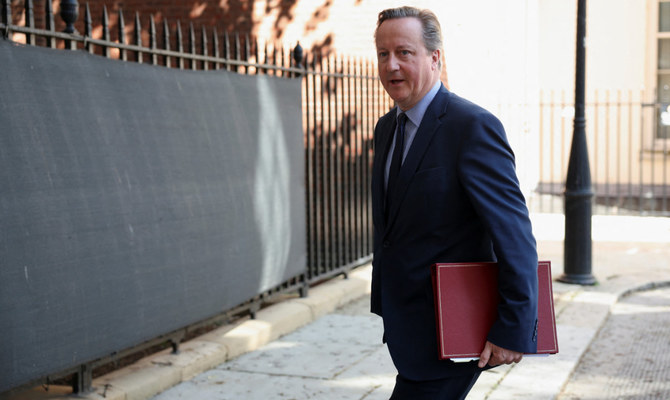
- The upcoming NATO summit must see all allies on track to deliver their pledge made in Wales in 2014 to spend 2 percent on defense
LONDON: Britain’s foreign minister, David Cameron, will urge its fellow NATO members to meet their pledge to spend 2 percent of GDP on defense, and to be tougher and more assertive with adversaries, in a speech to be delivered on Thursday.
In what is billed as his first major pronouncement as foreign secretary, Cameron will say NATO must “out-compete, out-cooperate and out-innovate,” and that Britain must not only bolster existing alliances but also forge new partnerships around the globe.
“We are in a battle of wills. We all must prove our adversaries wrong – Britain, and our allies and partners around the world,” Cameron will say at the UK’s National Cyber Security Center, according to extracts released by his office.
“The upcoming NATO summit must see all allies on track to deliver their pledge made in Wales in 2014 to spend 2 percent on defense. And we then need to move quickly to establish 2.5 percent as the new benchmark for all NATO allies.” Last month, Prime Minister Rishi Sunak said British defense spending would increase to 2.5 percent of GDP by 2030 — an additional 75 billion pounds ($94 billion) over the next six years.
Britain has been one of the most vocal and active backers of Ukraine in the wake of the invasion by Russia, and Cameron, a former prime minister, will say too nations are not learning the lessons of that conflict.
Some in Europe seem unwilling to spend on defense while war rages nearby, Cameron will say, adding that while some nations have criticized attacks on shipping in the Red Sea, only Britain and the United States have carried out strikes in retaliation.
“If (Russian President Vladimir) Putin’s illegal invasion teaches us anything, it must be that doing too little, too late only spurs an aggressor on,” he will say. .”.. This cannot go on. We need to be tougher and more assertive.”
Russia’s biggest airstrike in weeks piles pressure on Ukraine power grid
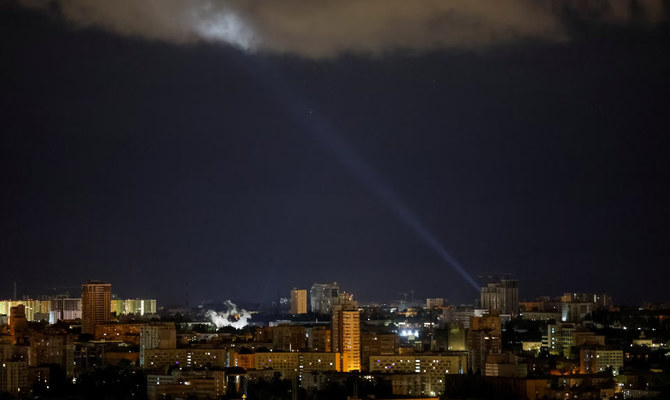
- Russia’s defense ministry said it struck Ukraine’s military-industrial complex and energy facilities in retaliation for Kyiv’s strikes on Russian energy facilities
KYIV: Russian missiles and drones struck nearly a dozen Ukrainian energy infrastructure facilities on Wednesday, causing serious damage at three Soviet-era thermal power plants and blackouts in multiple regions, officials said.
Ukraine’s air force said it shot down 39 of 55 missiles and 20 of 21 attack drones used for the attack, which piles more pressure on the energy system more than two years after Russia launched its full-scale invasion.
“Another massive attack on our energy industry!” Energy Minister German Galushchenko wrote on the Telegram app.
Two people were injured in the Kyiv region and one was hurt in the Kirovohrad region, Interior Minister Ihor Klymenko said.
Galushchenko said power generation and transmission facilities in the Poltava, Kirovohrad, Zaporizhzhia, Lviv, Ivano-Frankivsk and Vinnytsia regions were targeted.
Some 350 rescuers raced to minimize the damage to energy facilities, 30 homes, public transport vehicles, cars, and a fire station, the interior ministry said.
National power grid operator Ukrenergo said it was forced to introduce electricity cuts in nine regions for consumers and that it would expand them nationwide for businesses during peak evening hours until 11 p.m. (2000 GMT).
Ukrenergo CEO Volodymyr Kudrytskyi, interviewed by the Ukrainska Pravda media outlet, said electricity imports would not make up for power shortages. He said hydropower stations had also been hit, clarifying an earlier company statement omitting hydro stations from the list of affected facilities.
Power cuts for industrial users, he said, were “almost guaranteed” but interruptions for domestic users would depend on how well they reduced consumption.
“Many important power stations were damaged,” he said, citing three stations operated by DTEK, Ukraine’s biggest private company, as well as two hydropower stations.
“The damage is on quite a large scale. There is a significant loss of generating power, so significant that even imports of power from Europe will not cover the shortage that has been created in the energy system.”
Russia’s defense ministry said it struck Ukraine’s military-industrial complex and energy facilities in retaliation for Kyiv’s strikes on Russian energy facilities.
“As a result of the strike, Ukraine’s capabilities for the output of military products, as well as the transfer of Western weapons and military equipment to the line of contact, have been significantly reduced,” the ministry said.
WORLD WAR TWO ANNIVERSARY
President Volodymyr Zelensky noted the attacks were launched on the day Ukraine marks the end of World War Two.
“This is how the Kremlin marks the end of World War Two in Europe, with a massive strike, attempting to disrupt the lives of our people with its Nazism,” he said in his nightly video address.
In an earlier online address, Zelensky singled out what he said was the West’s limited progress in curbing Russian energy revenue and some countries that attended President Vladimir Putin’s inauguration for a fifth term in the Kremlin on Tuesday.
Fighting Nazism back then, he said, was “when humanity unites, opposes Hitler, instead of buying his oil and coming to his inauguration.”
Ukraine has stepped up drone attacks on Russian refineries this year despite apparent objections by the United States, trying to find a pressure point against the Kremlin whose forces are slowly advancing in the eastern Donbas region.
Ukrainian strikes on Russian refineries may have disrupted more than 15 percent of Russian oil refining capacity, a NATO military alliance official has said.
After pounding the energy system in the first winter of the war, Russia renewed its assault on the grid in March as Ukraine was running low on stocks of Western air defense missiles.
Prime Minister Denys Shmyhal estimated that more than 800 heating facilities had been damaged and up to 8 GW of power generation lost so far, adding the government needed $1 billion to fund repair work.
DTEK vowed to keep working to restore power at its facilities, and its CEO, Maxim Timchenko, called on Ukraine’s allies to provide more air defense systems.
Officials did not name the facilities hit on Wednesday, part of a policy of wartime secrecy that Kyiv says is needed to prevent Russia using the information for further strikes.
But Lviv governor Maksym Kozytskyi said Russia attacked a natural gas storage facility in his region in the west of the country, Radio Free Europe/Radio Liberty reported.
In central Poltava region, energy infrastructure was hit by a drone, Poltava Regional Governor Filip Pronin said.
The governors of Vinnytsia and Zaporizhzhia said critical civilian infrastructure facilities were damaged.



